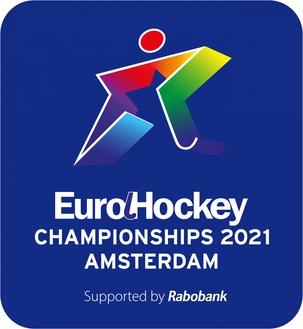Top Qs
Timeline
Chat
Perspective
2021 Men's EuroHockey Championship
From Wikipedia, the free encyclopedia
Remove ads
The 2021 Men's EuroHockey Championship was the 18th edition of the Men's EuroHockey Championship, the biennial international men's field hockey championship of Europe organised by the European Hockey Federation.
The tournament was held alongside the women's tournament at the Wagener Stadium in Amstelveen, Netherlands and was originally scheduled to take place from 20 to 29 August 2021.[1][2] However, following the postponement of the 2020 Summer Olympics to July and August 2021 because of the COVID-19 pandemic the tournament was rescheduled and took place from 4 to 13 June 2021.[3]
The top five teams qualified for the 2023 FIH Hockey World Cup.[4] The hosts Netherlands won the tournament for the sixth time, beating Germany in a 4–1 penalty shoot out after a 2–2 tie. The previous title holders Belgium won the bronze medal, defeating England with 3–2.[5]
Remove ads
Qualification
Along the hosts, the Netherlands, the top 5 teams at the 2019 EuroHockey Championship, which was held in Antwerp from 16 to 24 August, and the top 2 teams from the 2019 EuroHockey Championships II qualified.[1] The numbers in brackets are the pre-tournament world rankings of when the draw was made.[6]
Remove ads
Squads
Preliminary round
Summarize
Perspective
The pools were announced on 11 May 2020.[3]
All times are local (UTC+2).[7]
Pool A
Source: FIH
Rules for classification: 1) points; 2) matches won; 3) goal difference; 4) goals for; 5) head-to-head result; 6) field goals for.[8]
Rules for classification: 1) points; 2) matches won; 3) goal difference; 4) goals for; 5) head-to-head result; 6) field goals for.[8]
Pool B
Source: FIH
Rules for classification: 1) points; 2) matches won; 3) goal difference; 4) goals for; 5) head-to-head result; 6) field goals for.[8]
(H) Hosts
Rules for classification: 1) points; 2) matches won; 3) goal difference; 4) goals for; 5) head-to-head result; 6) field goals for.[8]
(H) Hosts
Remove ads
Fifth to eighth place classification
Summarize
Perspective
The points obtained in the preliminary round against the other team were carried over.
Source: FIH
Rules for classification: 1) points; 2) matches won; 3) goal difference; 4) goals for; 5) head-to-head result; 6) field goals for.[8]
Rules for classification: 1) points; 2) matches won; 3) goal difference; 4) goals for; 5) head-to-head result; 6) field goals for.[8]
Remove ads
First to fourth place classification
| Semi-finals | Final | |||||
| 10 June | ||||||
| 2 | ||||||
| 12 June | ||||||
| 3 | ||||||
| 2 (1) | ||||||
| 10 June | ||||||
| 2 (4) | ||||||
| 2 (3) | ||||||
| 2 (1) | ||||||
| Third place | ||||||
| 12 June | ||||||
| 2 | ||||||
| 3 | ||||||
Semi-finals
Third and fourth place
Final
Remove ads
Statistics
Summarize
Perspective
Final standings
| Team qualified for the 2023 World Cup |
Awards
The following awards were given at the conclusion of the tournament.[9]
Goalscorers
There were 121 goals scored in 20 matches, for an average of 6.05 goals per match.
6 goals
5 goals
4 goals
3 goals
2 goals
 Thomas Briels
Thomas Briels Florent Van Aubel
Florent Van Aubel Nicolas De Kerpel
Nicolas De Kerpel Lukas Windfeder
Lukas Windfeder Liam Ansell
Liam Ansell Zachary Wallace
Zachary Wallace Victor Charlet
Victor Charlet Timothée Clément
Timothée Clément Benjamin Marqué
Benjamin Marqué Blaise Rogeau
Blaise Rogeau Seve van Ass
Seve van Ass Thierry Brinkman
Thierry Brinkman Jeroen Hertzberger
Jeroen Hertzberger Robbert Kemperman
Robbert Kemperman Mirco Pruyser
Mirco Pruyser Marat Khairullin
Marat Khairullin Andrey Kuraev
Andrey Kuraev Semen Matkovskiy
Semen Matkovskiy Artem Nadyrshin
Artem Nadyrshin David Alegre
David Alegre Joan Tarrés
Joan Tarrés Gareth Furlong
Gareth Furlong
1 goal
 Cédric Charlier
Cédric Charlier Antoine Kina
Antoine Kina Adam Dixon
Adam Dixon James Gall
James Gall Chris Griffiths
Chris Griffiths Phil Roper
Phil Roper Nicolas Dumont
Nicolas Dumont Antonin Igau
Antonin Igau Charles Masson
Charles Masson Niklas Bosserhoff
Niklas Bosserhoff Florian Fuchs
Florian Fuchs Timm Herzbruch
Timm Herzbruch Paul-Philipp Kaufmann
Paul-Philipp Kaufmann Martin Zwicker
Martin Zwicker Billy Bakker
Billy Bakker Jonas de Geus
Jonas de Geus Evgeny Artemov
Evgeny Artemov Linar Fattakhov
Linar Fattakhov Alexander Skiperskiy
Alexander Skiperskiy José Basterra
José Basterra Marc Miralles
Marc Miralles Viçens Ruiz
Viçens Ruiz Owain Dolan-Gray
Owain Dolan-Gray Hywel Jones
Hywel Jones Jolyon Morgan
Jolyon Morgan
Source: FIH
Remove ads
See also
References
External links
Wikiwand - on
Seamless Wikipedia browsing. On steroids.
Remove ads

